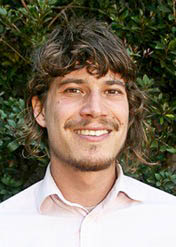After graduating from ISF in 2012, Antonio continued his work with two urban agriculture projects and the San Francisco Urban Agriculture Alliance. He began began work on two other food systems-related projects: the California Food Policy Council (where he was hired as a facilitator and research consultant) and the Frogtown Farm in St. Paul, Minnesota (where he was hired to lead a community design process). In the fall of 2013 Antonio began an MA program in Development Studies, majoring in Agrarian and Environmental Studies, at the Institute of Social Studies (ISS) in The Hague, Netherlands. He has had papers accepted by conferences at Yale University (Food Sovereignty: A Critical Dialogue) and Copenhagen Business School (Post-Growth Economies), and has another article in the early stages of peer review. Antonio writes: The flexible yet rigorous intellectual training I received doing the ISF major will no doubt strengthen my plan to continue into the PhD program here at ISS.
Antonio discusses his 2012 thesis:
Twenty-five years after it entered the mainstream of global development discourse, ‘sustainable’ remains a vague concept. Adopted by the powerful and the powerless, the term has been used to describe everything from consumer products to business decisions to cities and entire economic systems. Meanwhile, conciliatory democratic politics have suffered under a heavily money-influenced political process. This paper critiques conventional views on the definition of sustainability, and the proposed solutions that emerge therefrom. Ultimately, even the most useful concept in sustainable development discoursea focus on the three-legged stool encompassing social, ecological, and economic concernsremains inadequate. The failure to implement the three-legged stool in practice indicates that contradictions between desired outcomes in each leg are an inherent and perpetual problem for society. Modern sustainability discourse, in its focus on ideal outcomes, fails to provide guidance for what to do when these contradictions occur. In promoting deliberative democratic decision-making for government, business, and civil society as a means towards sustainability, I emphasize sustainability as a process, not an achievement, even if that process relies on some widely accepted sustainability indicators to gauge its direction. By paying attention to the limits and failures of current models of societal decision-making (including the role of economic structure in delimiting behavioral options), sustainability discourse can elaborate a successful alternative: widespread, multi-level, nested, and interacting deliberative democratic processes that address the arrangement of labor in society and the usage of natural resources. This paper also analyzes urbanization as a contentious subject within sustainability discourse, and as a key element in the development of deliberative democracy.
